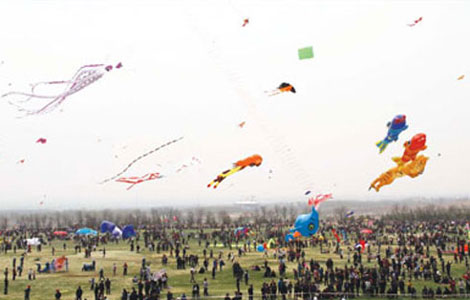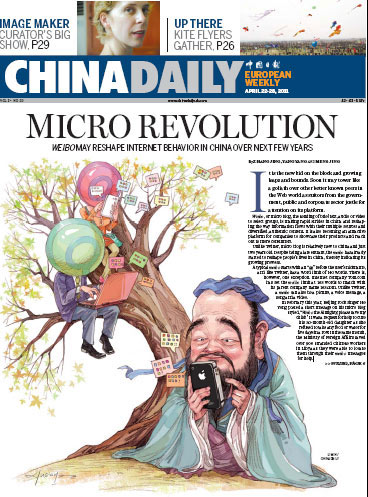Foreign and Military Affairs
China supports rational UN reform
Updated: 2011-04-07 07:30
By Zhang Yuwei (China Daily)
UNITED NATIONS - China abstained from the UN vote to enforce a no-fly zone over Libya as it "always opposes the use of force in international relations", the country's top representative to the world body said.
In an exclusive interview with China Daily, Li Baodong, China's permanent representative to the UN, said "military action only complicates the situation rather than resolves it".
But, taking into account the Arab League's proposal to establish a no-fly zone, as well as the positions of African countries and the African Union, and the special circumstances in Libya, he said, China opted to abstain from the vote rather than veto it, as it could have done as a permanent member of the UN Security Council.
China served as UN Security Council president in March when the body passed the resolution enforcing a no-fly zone over Libya and authorized "all necessary measures" to protect civilians in the North African nation. Four other nations abstained from the vote.
"We support the Security Council in taking appropriate and necessary action to stabilize the situation in Libya and end acts of violence against civilians," said Li, a seasoned diplomat who became permanent representative of China to the UN in March 2010 after serving in a similar post at the UN in Geneva.
Li expressed regret over recent developments, including military action in Libya.
Li added that China has consistently stressed that the council should comply with the UN Charter and international law, respect the sovereignty, independence, unity and territorial integrity of Libya, and help resolve the current crisis through peaceful means.
"The purpose of passing the resolution was to end violence and protect civilians. If the military action caused civilian casualties it would then create an even bigger humanitarian crisis," he said.
The council held 16 open meetings and 16 closed consultations in March, and reviewed Libya, Sudan, the Middle East, Cote d'Ivoire and other hotspots.
China also proposed an open debate on Somalia, seeking a comprehensive strategy for the country.
As council president, Li chaired three consultations on Sudan and issued media statements on the country.
A referendum on self-determination was held in south Sudan in January. The final results showed nearly 99 percent voted in favor of declaring independence in July.
The referendum was one of the consequences of the 2005 Naivasha Agreement between the Khartoum government and the Sudan People's Liberation Army/Movement.
But clashes broke out last month in Abyei, an oil-rich region claimed by both north and south Sudan.
The clashes claimed more than 100 lives and displaced thousands of people. Experts say Abyei, which has witnessed several outbreaks of violence since the 2005 peace deal, could potentially derail the whole peace process.
During his March presidency, Li met the Secretary-General of the Sudan People's Liberation Army Pa'gan Amum Okiech, and the permanent representative of Sudan to the UN, Daffa-Alla Elhag Ali Osman. Li exchanged views with both on the situation in Sudan and promoted peace talks.
"With efforts from all fronts, north and south Sudan agreed to resume talks regarding some outstanding issues and to form a joint commission to investigate the conflict in Abyei," Li said.
China respects the will and choice of the Sudanese people and appreciates the continuous efforts of north and south Sudan regarding the peace process, he added.
"We hope north and south Sudan will continue negotiations through dialogue to resolve outstanding issues with the principle of mutual understanding and compromise," Li said.
China was also president of the council in January 2010 but the March presidency coincided with the turmoil in the Middle East, Li said.
China adhered to the principles of fairness and neutrality, worked in an efficient and pragmatic fashion and coordinated with non-council members and other UN bodies, he said.
China supports "a necessary and rational reform of the Security Council".
Li stressed that reform should include not only council expansion, but also an improvement in its modus operandi to maintain its authority, increase efficiency and strengthen its global role.
"The reform should help improve the authority and efficiency of the council and make sure it more effectively performs its responsibilities entrusted to it by the UN Charter," he said.
Li said council reform should give "top priority" to increasing the representation of developing nations, especially from Africa.
"Reform should reflect the global trend of a democratization in international relations and give more small- and medium-sized countries access to the council and the decision-making process," he said.
While developing countries account for more than two-thirds of the entire UN membership, they are still under-represented in the council which has five permanent members - China, Russia, France, the UK and the US - who have the power of veto.
Li said the basis of reform is to enhance geographical representation to form a more balanced council.
"Reform is an issue of great sensitivity and complexity as it bears on the national interests of all UN member states," Li said, adding it should be based on "democratic discussions" to reach the broadest possible consensus which reflects the spirit of mutual compromise.
E-paper

Blowing in the wind
High-Flyers from around the world recently traveled to home of the kite for a very special event.
Image maker
Changing fortunes
Two motherlands
Specials

Costly dream
Uninhabited havens up for lease but potential customers face wave of challenges in developing them.

Models gear up car sales
Beauty helps steer buyers as market accelerates.

Urban breathing space
City park at heart of Changchun positions itself as top tourism attraction




